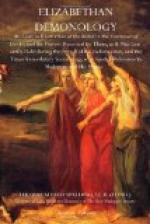1st. Urda.
[Past.] All hail, Macbeth! hail to thee, Thane of
Glamis!
2nd. Verdandi.
[Present.] All hail, Macbeth! hail to thee, Thane
of Cawdor!
3rd. Skulda. All hail, Macbeth! thou shalt be king hereafter.[2]
This sequence is supposed to be retained in other of the sisters’ speeches; but a perusal of these will soon show that it is only in the second of the above quotations that it is recognizable with any definiteness; and this, it must be remembered, is an almost verbal transcript from Holinshed, and not an original conception of Shakspere’s, who might feel himself quite justified in changing the characters of the speakers, while retaining their utterances. In addition to this, the natural sequence is in many cases utterly and unnecessarily violated; as, for instance, in Act I. sc. iii., where Urda, who should be solely occupied with past matters, predicts, with extreme minuteness, the results that are to follow from her projected voyage to Aleppo, and that without any expression of resentment, but rather with promise of assistance, from Skulda, whose province she is thus invading.
[Footnote 1: In a letter to The Academy, 8th February, 1879, signed “Charlotte Carmichael.”]
[Footnote 2: I have taken the liberty of printing this quotation as it stands in the text. The writer in The Academy has effected a rearrangement of the dialogue by importing what might be Macbeth’s replies to the three sisters from his speech beginning at l. 70, and alternating them with the different “Hails,” which, in addition, are not correctly quoted—for what purpose it is difficult to see. It may be added here that in a subsequent number of The Academy, a long letter upon the same subject appeared from Mr. Karl Blind, which seems to prove little except the author’s erudition. He assumes the Teutonic origin of the sisters throughout, and, consequently, adduces little evidence in favour of the theory. One of his points is the derivation of the word “weird” or “wayward,” which, as will be shown subsequently, was applied to witches. Another point is, that the witch scenes savour strongly of the staff-rime of old German poetry. It is interesting to find two upholders of the Norn-theory relying mainly for proof of their position upon a scene (Act I. sc. i.) which Mr Fleay says that the very statement of this theory (p. 249) must brand as spurious. The question of the sisters’ beards too, regarding which Mr. Blind brings somewhat far-fetched evidence, is, I think, more satisfactorily settled by the quotations in the text.]




